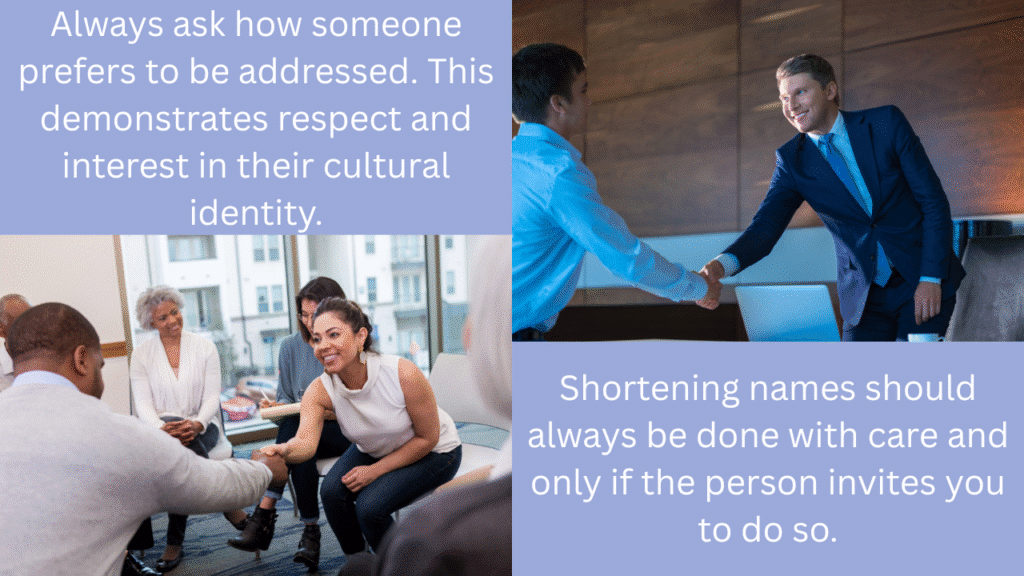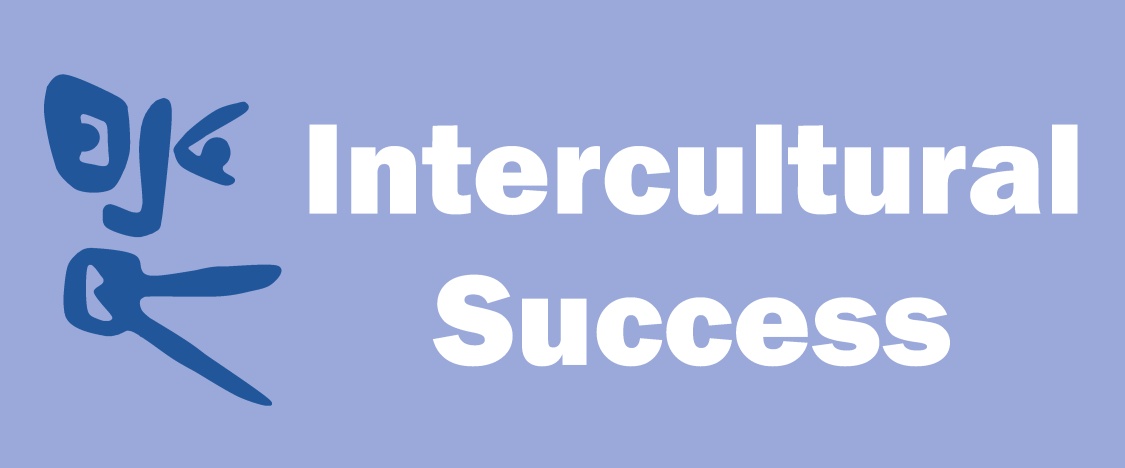If you are working globally you will encounter a lot of names and want to know how to respect everyone’s culture.
In an increasingly interconnected world, it is common to work with colleagues, clients, and collaborators from a wide range of cultural backgrounds. One of the most fundamental and respectful ways to engage with others is to use their name correctly. However, naming customs vary significantly around the globe, and what feels natural in one culture may be inappropriate in another.
So how can you ensure that you are using the correct name for each person you meet globally? It requires cultural awareness, active listening, and a willingness to ask respectful questions. Below are some key considerations, along with examples from different parts of the world, to guide you in addressing people appropriately and respectfully.
Using the correct name globally is a huge topic, but if you are showing interest and adapting your usual way of addressing people, you will be successful.
There are three things I keep in mind all the time in order to respect everyone’s culture, and to understand mine better.
- Be tolerant.
- Don’t take anything personally because it probably isn’t.
- Ask questions and encourage others to ask you questions.
If someone uses your first name rather than second name, or shortens your name, then be accepting. It is probably because of a cultural difference and does not reflect lack of respect or lack of formality.
Respect Everyone’s Culture with Successful Understanding of Names
First or Last Name?
This is often the first question you may be asking yourself. If you have been given two names for a person, do you use the last one or the first one.
In many English-speaking countries, such as the United Kingdom, South Africa, the USA, Canada, New Zealand, and Australia, people generally introduce themselves using their given name (first name) followed by their surname or family name (last name). In most informal or workplace settings, it is acceptable to address people by their first name, although this may not always be appropriate elsewhere. If in doubt, use their title (Mr, Mrs, Ms, Dr..) followed by their last name and then you will probably be invited to use their first name.
In Ethiopia, the naming structure is quite different. Individuals have two names: their given name, followed by their father’s given name. Then, someone named “Alemu Bekele” would typically be referred to as “Alemu,” not “Mr. Bekele,” because Bekele is his father’s name, not a family surname. However, in formal situations, it is courteous to use the person’s given name with a title: “Ato” for a man, “Wozero” for a married woman, and “Woizerit” for an unmarried woman.
In Brazil, a person’s full name often includes multiple surnames from both sides of the family. For example, “Fernanda Oliveira dos Santos” might be addressed formally as “Ms. Oliveira dos Santos,” not Ms Santos. However, as in all cases, it is best to follow the person’s lead or to check. In social and professional settings, Brazilians often use first names, especially if the tone is informal.
In Arabic-speaking cultures, such as in Egypt, Saudi Arabia, Jordan, or the UAE, names often consist of a given name followed by a chain of patronymics (father’s name, grandfather’s name, etc.). A man named “Ahmad bin Yusuf Al-Khalidi” may be addressed formally as “Mr. Al-Khalidi,” where “Al-Khalidi” indicates the family or tribal name. The word “bin” (meaning “son of”) can appear in full names but is usually omitted in everyday address. In professional or respectful settings, it is appropriate to use a title and the family name (e.g., “Dr. Al-Khalidi”). Women may use “bint” (daughter of), such as in “Fatima bint Omar Al-Fulan.”
To give another example, “Layla Ahmad Al-Hashimi” includes a given name (Layla), a father’s name (Ahmad), and a family name (Al-Hashimi). In most professional settings, you should refer to the individual by title and family name, unless instructed otherwise.
It’s also common in some Gulf countries to be referred to using the name of the eldest child, e.g., “Umm Khalid” (mother of Khalid) or “Abu Salim” (father of Salim), in informal or social settings.
Do You Use Two Names?
In Spanish-speaking countries across South America, such as Argentina and Colombia, people usually have two surnames: one from their father and one from their mother. For instance, “Carlos Méndez Rodríguez” should not be referred to as “Mr. Rodríguez,” since “Méndez” is the first surname and the one used for formal address. In written communication, to respect everyone’s culture, include both surnames unless told otherwise. In social settings and informal business situations, then the first name is OK, so in this example, use “Carlos.”
In Kenya and other East African countries, naming conventions can reflect ethnic traditions. In Kikuyu culture, for example, names often include a given name and a traditional name. Someone might be called “Wanjiru Njeri,” and it is polite to ask how they would like to be addressed. Some people may use their Christian or English name in professional settings, while others may prefer their traditional name.
In Ghana, a person may have a “day name” – based on the day of the week they were born – in addition to their family name and given name. For example, a man named “Kofi Mensah” might be addressed as “Mr. Mensah” formally, but friends and colleagues might call him “Kofi.” It is best to wait until someone introduces themselves or shares their preference.
Should You Use a Title?

Titles are an important marker of respect in many cultures. In Nigeria, for example, honorifics such as “Chief,” “Alhaji,” or “Madam” may be used depending on the person’s status, religion, or achievements. Addressing someone as “Chief Okonkwo” or “Madam Aisha” shows recognition of their standing.
In Colombia and Peru, professional titles such as “Doctor” or “Ingeniero” (Engineer) are often used in formal settings, even when the context is not related to their field. Referring to someone as “Doctor Gómez” or “Ingeniera Martínez” is a sign of respect and is commonly expected.
In Thailand, the title “Khun” is used before the first name, regardless of gender, such as “Khun Somchai.”
In contrast, in Mozambique and Angola, both Portuguese-speaking countries, formal address follows the Portuguese style – using “Senhor” or “Senhora” before the surname.
In Arabic-speaking countries, professional and honorific titles are deeply respected. Common ones include “Sheikh” (a title of respect for elder or religious figure), “Sayyid” or “Sitt” (Mr./Ms. in Levantine dialects), and “Dr.” for those with academic or medical qualifications. In formal settings, “Dr. Hassan Al-Rashid” or “Engineer Fatima Al-Mansour” would be used in full. In religious contexts, titles like “Imam,” “Sheikha,” or “Hajji/Hajja” (one who has completed the pilgrimage to Mecca) may also be used.
In general to make sure that you respect everyone’s culture, investigate and research titles in advance.
Can You Shorten a Name and still Respect Everyone’s Culture?
Shortening names should always be done with care and only if the person invites you to do so. In Brazil, nicknames are common, and someone named “João Carlos” might go by “João” or “Joca” among friends. However, it is best to wait until the individual introduces themselves using a shortened name before adopting it.
In Zimbabwe, names may carry deep personal or spiritual meanings. A name like “Tendai,” meaning “thankful,” should be used in full unless the person chooses to offer a nickname. Similarly, in Tanzania, names often reflect Swahili words or religious heritage and altering them without permission can be seen as disrespectful.
In Arabic cultures, it is common to hear affectionate nicknames or diminutives used among family and close friends. For example, “Mohammad” might become “Mo,” and “Fatima” might be called “Fafa” in informal contexts. However, in professional or unfamiliar settings, it is best to use the full name unless the person suggests otherwise. Avoid assuming or shortening Arabic names without permission, as the meanings and structure often carry deep familial and religious significance.
Practical Tips for Names Globally to Respect Everyone’s Culture

Here are four practical tips to respect everyone’s culture globally.
Ask
Always ask how someone prefers to be addressed. This demonstrates respect and interest in their cultural identity.
Listen
Listen carefully to how people introduce themselves and follow their lead in how they use names.
Order and pronunciation
Respect name order and pronunciation. These may differ from your own cultural norms, and making the effort shows thoughtfulness.
Formal first
When in doubt, use formal titles until invited to use first names or informal terms.
What to do if someone calls you by a name you are not comfortable with
If it is a pronunciation issue, then correct them gently. At the same time, also make sure that you are pronouncing their name correctly. For example, the name “Guy” is pronounced differently depending on whether Guy is from an English speaking or French speaking country.
If someone has shortened your name and you are not comfortable with that, then explain that you only ever use your full name. Clear communication sets respectful boundaries and helps others get it right in the future. If someone, does use a name that you are not comfortable with then, simply reply by saying, “It is good to meet you and please call me X.” For example, my name is Caroline Gregory. If someone calls me Gregory or Ms Gregory, then I simply reply, “Nice to meet you too, and please call me Caroline.”
If someone calls you sister or brother or dear, and to your ear it sounds ‘surprising,’ consider the cultural angle and also consider whether this may be a translation from the speaker’s native tongue.
Conclusion to Names Globally – How to Respect Everyone’s Culture
In conclusion, names are more than just identifiers, they reflect culture, heritage, and personal history.
By approaching them with care and attention, especially in global interactions, we show respect and sensitivity. Whether working with colleagues from Ghana, Brazil, Peru, Japan, Poland, or the UAE, taking the time to understand how to address someone correctly can help grow trust, strengthen relationships, and contribute to a more inclusive and respectful environment.
If it is obvious that you are trying to respect everyone’s culture and use the culturally correct name, then that will be viewed as very positive. If you do make errors, don’t worry. As long as there is an open dialogue, it will always be OK in the end.
Further reading
Twelve innovative ways for native English speakers to be clearer

Intercultural Success Coaching and Training
Are you responsible for a global team or are you part of a global term? Is communication sometimes a challenge? Intercultural Success can support your leadership and personal challenges. Working with you and your team members to make global communication and cultural understanding easier and more successful.
We have decades of experience and have helped hundreds of leaders and managers across the world manage expatriation and repatriation challenges.
Contact us today to discuss your challenges.

